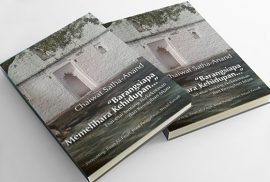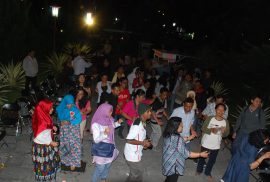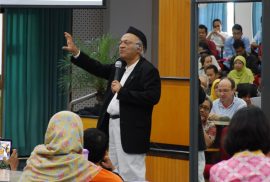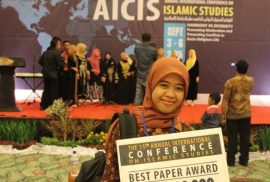Azis Anwar Fachrudin | CRCS | Article
In two consecutive days of this week, the world’s two biggest religions commemorate the birth of their respective “founders”: Islam’s Prophet Muhammad (Maulid) and Christianity’s Jesus Christ (Christmas). This is certainly a rare event that will not happen for dozens of years to come.
In Indonesia, both commemorations have officially been declared national holidays. Indonesia is among most Muslim-majority countries in which Maulid constitutes a national public holiday. It is only in Saudi Arabia and Qatar, out of all Muslim majority countries, where Maulid is not a holiday, probably because of the views of clerics there who regard Maulid celebration as Islamically illegitimate and bid’ah (heretical). Besides, Indonesia is among several Muslim-majority countries that recognize Christmas as a national holiday.
This is a momentous time for both Muslims and Christians to reinforce interfaith dialogue — it probably could be incorporated in the agenda of the commemorations.
For Indonesians in particular, it is worth being grateful that the annually held debate among people at the grassroots — on whether saying “Merry Christmas” to Christians is religiously allowed for Muslims — is coming to an end. Additionally, another annual debate on whether Muslims may celebrate Maulid has generally begun decreasing.
In fact, these two debates on Maulid and Christmas are mostly fueled by Wahhabist views. Across the Muslim world, it is mostly the Wahhabists who claim that saying “Merry Christmas” is tantamount to affirming Christian belief on Jesus’ divinity and as such forbidden.
And why is the debate now not as heated as in the previous years? I heard a satirical comment in social media saying that it is because the Wahhabists are nowadays preoccupied with declaring the Shiites infidels. A plausible explanation! The sense of “feeling threatened” has now been shifted from Christians to Shiites, as well as to communists (whose political party no longer exists).
As for interreligious dialogue, now is a good time to recall and to remind Muslims and Christians of the document, A Common Word Between Us and You, which was launched in 2007. Originally an open letter to the Catholic pope, it has now been signed by hundreds of the world’s leading Muslim scholars and intellectuals (it can be accessed at acommonword.com). The document basically conveys that there are more common grounds for peace between Muslims and Christians than conflicting teachings. The document was then responded to by Loving God and Neighbor Together: A Christian Response to A Common Word, which was initially signed by more than 300 Christian leaders and scholars.
These kinds of documents should be more endorsed by respective leaders, clerics and scholars, for at least two reasons. First because, particularly in Indonesia, the document seems to be less exposed to the public. Second, nowadays we see a rising intolerance in the respective worlds. The rise of Islamophobia in the West, not only in Europe but also in the US given the recent phenomenon of presidential hopeful Donald Trump, is a good example.
On the other side, the Muslim world is now suffering from radicalization, resulting in the emergence of the Islamic State (IS) movement. This is why peace-building and tolerance activists should work harder to win the discourse in the respective worlds, including for example by exposing their respective communities to the documents.
As for the Muslim world, the Maulid commemoration can be a good time to reread the Prophet’s biography, not only to praise or glorify him but also to deal with how we should understand his having been a leader of wars in today’s context. Around the globe, Muslims usually celebrate Maulid by reciting salawat (prayers) or madah nabawi (a kind of eulogy to praise the prophet). In Indonesia particularly, Muslims recite books containing Arabic poetry of salawat or madah nabawi.
I think that in today’s context such a reading of the Prophet’s biography, while good, should be furthered with rereading about the violence surrounding his life. This is important because some Muslims who do violence nowadays quite often justify their acts by citing examples of the violence commanded by the prophet.
Prophet Muhammad, unlike Jesus, was a leader in war. He was involved in nine wars. Furthermore, he dispatched military expeditions at least 38 times. Some early biographers of the Prophet emphasized this aspect; this is why their books were entitled Maghazi (literally “wars”) and it became a genre of biography at the time. All these wars left hundreds of victims and happened during eight years from 2 AH to 9 AH, a period in the last phase of Muhammad’s prophetic ministry when Muslims became quite powerful.
How then should today’s Muslims read those wars led by the Prophet? This has very much to do with Islamic jus ad bellum, especially on what circumstances violence can be justified under Islamic teachings. Rereading these, I think, is more important as a counter interpretation of violent Muslims rather than saying normatively that “Islam is a religion of peace” or that “rahmatan lil-‘alamin” (“the prophet was sent as a mercy for all creatures”).
Articles
Azis Anwar Fachrudin | CRCS | Article
Is it possible and necessary to have voices from Islam that are both against and for a moratorium on the death penalty? I think it is necessary, as what shapes discourse in the Muslim communities of Muslim-majority countries can influence policies in those countries. In Indonesia, for instance, an interpretation of sharia promoting a moratorium on the death penalty has been raised, but it is unfavorable to many Muslim scholars.
 Amid the uproar concerning the death penalty for Indonesian migrant workers in Saudi Arabia, as well as that of drug convicts in Indonesia, opposing voices in the name of Islam are barely heard. Nahdlatul Ulama (NU), the largest Muslim organization in Indonesia, considered moderate by many, condemned the death penalty for migrant workers in Saudi Arabia, yet supported the death penalty for drug convicts. But in general, the death penalty is a non-issue for Islamic organizations.
Amid the uproar concerning the death penalty for Indonesian migrant workers in Saudi Arabia, as well as that of drug convicts in Indonesia, opposing voices in the name of Islam are barely heard. Nahdlatul Ulama (NU), the largest Muslim organization in Indonesia, considered moderate by many, condemned the death penalty for migrant workers in Saudi Arabia, yet supported the death penalty for drug convicts. But in general, the death penalty is a non-issue for Islamic organizations.
First, this is maybe because death penalty cases in general scarcely touch the issue of Muslim identity politics — many so-called secular Muslims are on both sides of the debate. Second, capital punishment, along with corporal punishment, is prescribed in Islamic scripture so it is very difficult, though not impossible, to have a voice of Islam that is against the death penalty.
However, 21st century Muslims should review the practices of the death penalty in Muslim-majority countries and this can be done even within the realm of Islamic teachings or sharia. Here are the premises.
Sharia by many Muslims nowadays is reductively understood in terms of legalistic formulae. Sharia is associated with corporal and/or capital punishment, as if sharia is nothing but a penal code and punishments. Yet sharia literally means the way or path. In Koranic terminology, it means the path toward an objective representative of the supreme virtue of Islam, which is justice (some would add dignity of human beings and mercy and love for all creatures).
Muslim scholars, ranging from reformists, rationalists, even literalists, would agree that the supreme value promoted by Islam when it comes to dealing with relationships among individuals and/or communities is justice, as explicitly stated and commanded by God many times in the Koran. The mercy that Islam would bring to the world is justice.
Any action leading to injustice, in whatever name, including in the name of Islam, is therefore un-Islamic and should be opposed by Muslims. All Islamic legal opinions that are against justice are thus against the sharia of Islam.
As God has commanded Muslims to be “bearers of witness with justice”, as the Koran states, Muslims should share the notion once voiced by Martin Luther King Jr. that “injustice anywhere is a threat to justice everywhere”. All unjust punishments should be an Islamic issue, including questions over the death penalty of Indonesian migrant workers and foreign and local drug convicts.
Now, the question is how justice is manifested in punishment. The traditional fiqh (Islamic law and jurisprudence) is still lacking discussion of the philosophy of justice compared to advanced discourse in the secular realm, which has led to the concept of restorative justice, distinguished from retributive justice. The idea of qisas (an eye for an eye) is mostly understood as a deterrent and/or equal retaliation within retributive justice.
Nevertheless, Muslim scholars advocating a moratorium on the death penalty are echoing these arguments: corporal punishment, stoning or the death penalty cannot be implemented within an unjust system of governance, judiciary, or an unequal society, given the fact that those punishments are irreversible.
In this view, a just system is a prerequisite of such irreversible punishments. An unjust system is considered one of the shubuhat (ambiguities) based upon which the irreversible punishment must not be applied, as the Prophet Muhammad said. Included in that unjust system are dictatorships that are still embraced by many Muslim-majority countries, where the weak and poor are more likely to be punished than the wealthy and powerful.
That is the argument posed by some NU leaders in criticizing Saudi Arabia’s death penalty for Indonesian migrant workers, given frequent reports of torture and other dehumanizing practices by employers.
With regard to restorative justice, Mutaz M. Qafisheh from Hebron University in the International Journal of Criminal Justice Sciences wrote that Islamic jurisprudence had many alternatives to original punishments known in modern restorative justice systems, such as compensation (diya), conciliation (sulh) and pardon (afw). These mechanisms are stated in the Koran and were exemplified by the Prophet. Qafisheh also says that classical Muslim scholars had unique mechanisms derived from the wider principles of Islam that can be understood as restorative means, such as repentance (tawba), intercession (shafaa), surety (kafala) and expiation (kafara).
He concludes: “By looking at the philosophy of penalty as detailed by Islamic jurisprudence […] restorative justice does exist. It exists as the general rule. Retributive justice is the exception.”
That kind of reinterpreting of Islamic scripture should be advanced by today’s Muslim scholars if Muslims want to be able to respond to the discourse of international human rights.
Also, for the Muslims who are so obsessed with the rules textually prescribed in the scripture, we should consider the notion that God’s revelation is not only in the text (ayat qauliyyah) but exists also in the universe (ayat kauniyyah), in the way human beings behave. Modern sociology and criminology should be juxtaposed and mirrored with traditional fiqh by Muslim jurists in their interpretations of the scripture.
Azis A. Fahrudin | CRCS | News
The writer is a graduate student of CRCS batch 2014. This article is his response to Chaiwat Satha-Anand’s compilation articles published by PUSAD Paramadina, Jakarta and his lecture at CRCS on October 8, 2015.
T he book by Chaiwat Satha-Anand entitled “Barangsiapa Memelihara Kehidupan…” consists of a number of essays dealing with, as the subtitle of the book suggests, “nonviolence and Islamic imperatives.” The book seeks to propose theological arguments for nonviolent Islam. Many parts of the book are, thus, filled with Quranic verses and stories and quotes cited from the prophetic traditions which, according to Satha-Anand’s interpretation, support the idea of nonviolent Islam. However, the way he constructs theological arguments is not rigorous enough, especially in consideration of the fact that the position of scripture (both the Quran and the hadiths) toward violence and peace is ambiguous and multi-faceted, a position which in turn brings about complexities of interpretation. This article, thus, serves as a response to Satha-Anand’s ideas of nonviolent Islam as explained in the book. It discusses, first, violence in the scripture, both in the Quran and the prophetic traditions, to show the multi-faceted accounts and some difficulties in interpreting them. Second, it draws several points which should be taken into consideration in dealing with that complexity of interpretation—including in showing the ambivalence of the scripture. In the end, it points out that, besides proposing nonviolent interpretations of Islam, the way the perpetrators of violence perceive the surrounding reality they face must be given equal attention in the discussion.
he book by Chaiwat Satha-Anand entitled “Barangsiapa Memelihara Kehidupan…” consists of a number of essays dealing with, as the subtitle of the book suggests, “nonviolence and Islamic imperatives.” The book seeks to propose theological arguments for nonviolent Islam. Many parts of the book are, thus, filled with Quranic verses and stories and quotes cited from the prophetic traditions which, according to Satha-Anand’s interpretation, support the idea of nonviolent Islam. However, the way he constructs theological arguments is not rigorous enough, especially in consideration of the fact that the position of scripture (both the Quran and the hadiths) toward violence and peace is ambiguous and multi-faceted, a position which in turn brings about complexities of interpretation. This article, thus, serves as a response to Satha-Anand’s ideas of nonviolent Islam as explained in the book. It discusses, first, violence in the scripture, both in the Quran and the prophetic traditions, to show the multi-faceted accounts and some difficulties in interpreting them. Second, it draws several points which should be taken into consideration in dealing with that complexity of interpretation—including in showing the ambivalence of the scripture. In the end, it points out that, besides proposing nonviolent interpretations of Islam, the way the perpetrators of violence perceive the surrounding reality they face must be given equal attention in the discussion.
Asep Salik | CRCS | News

Kamis, 8 oktober 2015, CRCS melangsungkan rangkaian kegiatan ulang tahunnya yang ke-15. Bertempat di ruang auditorium gedung Sekolah Pascasarjana, rangkaian acara ini diawali dengan kuliah umum “Nurcholish Madjid Memorial Lecture 2015; Understanding Islam and Politics in the Twenty-First Century”, yang menghadirkan Chaiwat Satha-Anand sebagai narasumber utama. Guru besar Ilmu Politik Universitas Thammasat, Thailand, yang juga dikenal sebagai pemikir serta aktivis nirkekerasan agama ini mempresentasikan makalahnya dengan judul The Sacred in The Mirror. Kuliah umum yang berlangsung mulai pukul 09.00 WIB pagi ini diawali dengan pemutaran film profil CRCS dan dilanjutkan dengan beberapa persembahan lagu dari Josskustik, grup band gabungan mahasiswa dan staf CRCS.
Asep Salik | CRCS
 Agar tak terjebak dalam kekerasan, keterlibatan setiap muslim dalam dunia politik dan segala sendi kehidupan di dunia meniscayakan satu hal, yakni, sebagaimana ditawarkan Chaiwat Satha-Anand, “hadirnya kesadaran untuk menggeluti Realitas Ilahiah tanpa harus kehilangan kemampuan mempertanyakan diri, orang lain, dan dunia.” Hal ini dapat dicapai dengan, antara lain, meletakkan Yang Sakral di dalam cermin. Dengan begitu, seorang muslim dapat membangun jarak ideal antara dirinya dengan Yang Sakral, sehingga ia tidak menjadi—meminjam istilah Hent de Vries—“ngengat yang terpesona oleh api hingga terlalap olehnya.” Chaiwat Sata-Anand mengungkapkan hal ini dalam acara “Nurcholis Madjis Memorial Lecture” (NMML) yang digelar pada hari Kamis, 8 Oktober 2015 lalu di gedung sekolah Pascasarjana Universitas Gadjah Mada (UGM). Kuliah umum yang mengambil tema The Sacred in The Mirror; Islam and Politics in The 21st Century ini merupakan bagian dari rangkaian acara peringatan ulang tahun Program Studi Agama dan Lintas Budaya (CRCS) UGM yang kelima belas.
Agar tak terjebak dalam kekerasan, keterlibatan setiap muslim dalam dunia politik dan segala sendi kehidupan di dunia meniscayakan satu hal, yakni, sebagaimana ditawarkan Chaiwat Satha-Anand, “hadirnya kesadaran untuk menggeluti Realitas Ilahiah tanpa harus kehilangan kemampuan mempertanyakan diri, orang lain, dan dunia.” Hal ini dapat dicapai dengan, antara lain, meletakkan Yang Sakral di dalam cermin. Dengan begitu, seorang muslim dapat membangun jarak ideal antara dirinya dengan Yang Sakral, sehingga ia tidak menjadi—meminjam istilah Hent de Vries—“ngengat yang terpesona oleh api hingga terlalap olehnya.” Chaiwat Sata-Anand mengungkapkan hal ini dalam acara “Nurcholis Madjis Memorial Lecture” (NMML) yang digelar pada hari Kamis, 8 Oktober 2015 lalu di gedung sekolah Pascasarjana Universitas Gadjah Mada (UGM). Kuliah umum yang mengambil tema The Sacred in The Mirror; Islam and Politics in The 21st Century ini merupakan bagian dari rangkaian acara peringatan ulang tahun Program Studi Agama dan Lintas Budaya (CRCS) UGM yang kelima belas.
Interviewed by: Bandri
Maurisa Zinira, alumnus CRCS angkatan 2011 terpilih menjadi salah satu penerima Best Paper Award pada International Conference on Islamic Studies (AICIS) di Manado, 3-6 September 2015. Pada konferensi tahunan yang diselenggarakan oleh Direktorat Pendidikan Tinggi Islam (Diktis), Kementrian Agama Republik Indonesia ini, Maurisa mempresentasikan makalah berjudul “The Rupture of Brotherhood: Understanding JI-Affiliated Groups over ISIS”. Berikut hasil obrolan CRCS dengan Maurisa tentang papernya.







